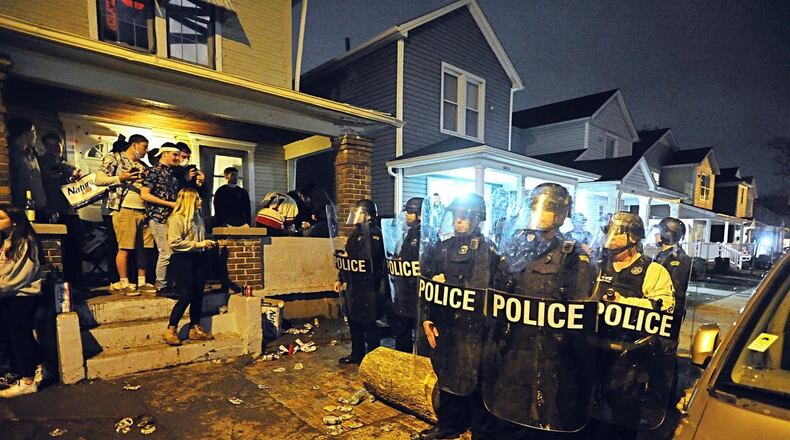“We maintain a solid partnership with the Dayton Police Department and the city of Dayton and are in favor of a measure that could enhance the safety of our students, campus community and first responders,” UD officials said in a statement to the Dayton Daily News.
Wild parties in the residential areas around UD campus around St. Patrick’s Day and the March Madness basketball tournament have led to clashes with police and arrests for offenses like disorderly conduct, riot and resisting arrest.
Parties and large gatherings at Airbnb properties and other short-term rental housing units in the city have resulted in fights, noisy and disruptive activities, shootings and other problems.
City officials said the law would provide police with new tools to address dangerous and reckless driving and “hooning” in some areas.
They say it also would help with large gatherings like an unlicensed fireworks show that took place in West Dayton last year.
“Now this can help hold those responsible for such gatherings accountable,” said Dayton police Lt. Col. Eric Henderson.
On Wednesday night, the Dayton City Commission had the first reading of an ordinance that would create a new “nuisance party” law.
The legislation defines nuisance parties as those that include activities like disorderly conduct, property destruction, traffic offenses and disruptions, unlawful alcohol sales and consumption, public indecency, illegal drug use, loud noise and littering.
The law would allow police to cite people who own or occupy properties where nuisance parties are held.
The first violation of this provision would be a minor misdemeanor criminal charge, but subsequent offenses within a 12-month timeframe would lead to third- and fourth-degree misdemeanor charges.
Under the ordinance, nuisance parties must cease upon the order of the police chief or his designee, and people who do not live at the premises who fail to leave can be charged with a fourth-degree misdemeanor criminal offense.
Henderson, who is the assistant police chief, said the police department did not ask for the new law based on any one incident or specific event.
He said the new law will help police deal with problem activities at rental properties and after-hours alcohol establishments.
He said the law also would help police break up large gatherings like one seen last Fourth of July holiday when people fired off fireworks and hung out in the street and in buildings along Gettysburg Avenue.
Large crowds gathered to watch what police described as unlicensed fireworks show, which led to the street being shut down to protect bystanders.
Dayton City Manager Shelley Dickstein said the law would will give police the authority to deal with nuisance activities that have become popular since the start of COVID pandemic, like reckless and dangerous hooning driving stunts that have been going on in residential and business areas.
Dickstein also said the ordinance would help police address St. Patrick’s Day celebrations, illegal pop-up bars and large gatherings like the unlicensed fireworks show.
The ordinance is expected to be voted on about two weeks from now.
If the ordinance is approved, UD officials said the university will evaluate and communicate to the community how it may affect large gatherings in the student neighborhood.
Janet Michaelis, a Dayton resident who is the Airbnb host community leader for the Dayton and Cincinnati region, said she supports the proposed legislation because it will help Airbnb hosts hold bad guests accountable.
She said the current regulations in place for removing guests in Airbnb short-term rentals who misbehave and create nuisance conditions are not clear enough to quickly handle these problems.
“This ordinance will help protect our properties and our relationships with our neighbors,” she said.
About the Author



